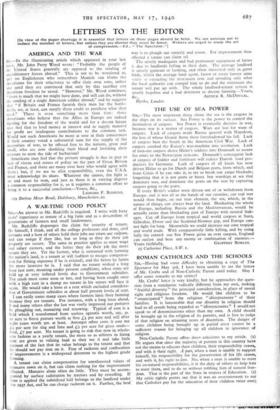A WAR-TIME FOOD POLICY SIR,—An answer to Mr. Radcliffe is
required. I write with forty years' experience as tenant of a big farm and as a descendant of generations of farmers and small landowners.
Mr. Radcliffe disparages the claim for security of tenure. lie hirnself, I think, and all the college professors and dons, civil servants and a host of others hold their jobs aut vitam aut culpam, and can resign if they like, but so long as they do their job properly are secure. The same in practice applies to most wage and salary earners, and the better they do their job the more secure they are. Yet the farmer, who is entrusted with farming the nation's land, is a tenant at will (subject to meagre compensa- tion for flitting expenses if he is evicted), and the better he farms the more insecure he is. I said that no tenant wished a long lease just now, meaning under present conditions, when rents are held up at very inflated levels due to Government subsidies. The crash must come soon or late, and having been caught once with a high rent in a slump no tenant in his senses will face it again. He would take a lease at a rent which excluded considera- tion of Government subsidies at about half present levels of rent.
I Can easily name many cases where farmers limit their farming because they are tenants. For instance, with a long lease ahead, I and Many others after the last war vastly improved our pastures by ploughing out, manuring and resowing. Typical of cost is a field which I transformed from useless agrostis worth, say, 5s. an acre to finest pasture worth at first £3 per acre and still after eight years worth 3os. at least. Amongst other costs it cost me £4 per acre for slag and lime and £3 per acre for grass seeds— total, £7 per acre. No tenant is going to risk that now in whole- sale fashion as a yearly tenant, the more so as arbiters in fixing rent are given to Valuing land as they see it and take little account of the fact that its value belongs to the tenant and that he should not pay rent on it. Fear of rackrent and confiscation of improvements is a widespread deterrent to the highest grade farming.
A tenant can claim compensation for unexhausted values of manures sown on it, but can claim nothing for the improvement drected. Manures alone often do little. They must be accom- panied by surface cultivation by tractors and by reseeding. If I:me is applied the subsidised .half belongs to the landlord under the 1937 Act, and he can charge rackrent on it. Further, the bese,
way is to plough out entirely and resow. For improvement thus effected a tenant can claim nil.
The utterly inadequate and bad permanent equipment of farms is due to landlords failing in their duty. The average landlord is utterly ignorant of farming, and often interested only in game birds, whilst the average land agent, factor or estate lawyer aims solely at extracting the maximum rent and spending only what the local authority can compel him to do and the minimum the tenant will put up with. The whole landlord-tenant system is utterly hopeless and a bad deterrent to decent farming.—Yours,


































 Previous page
Previous page